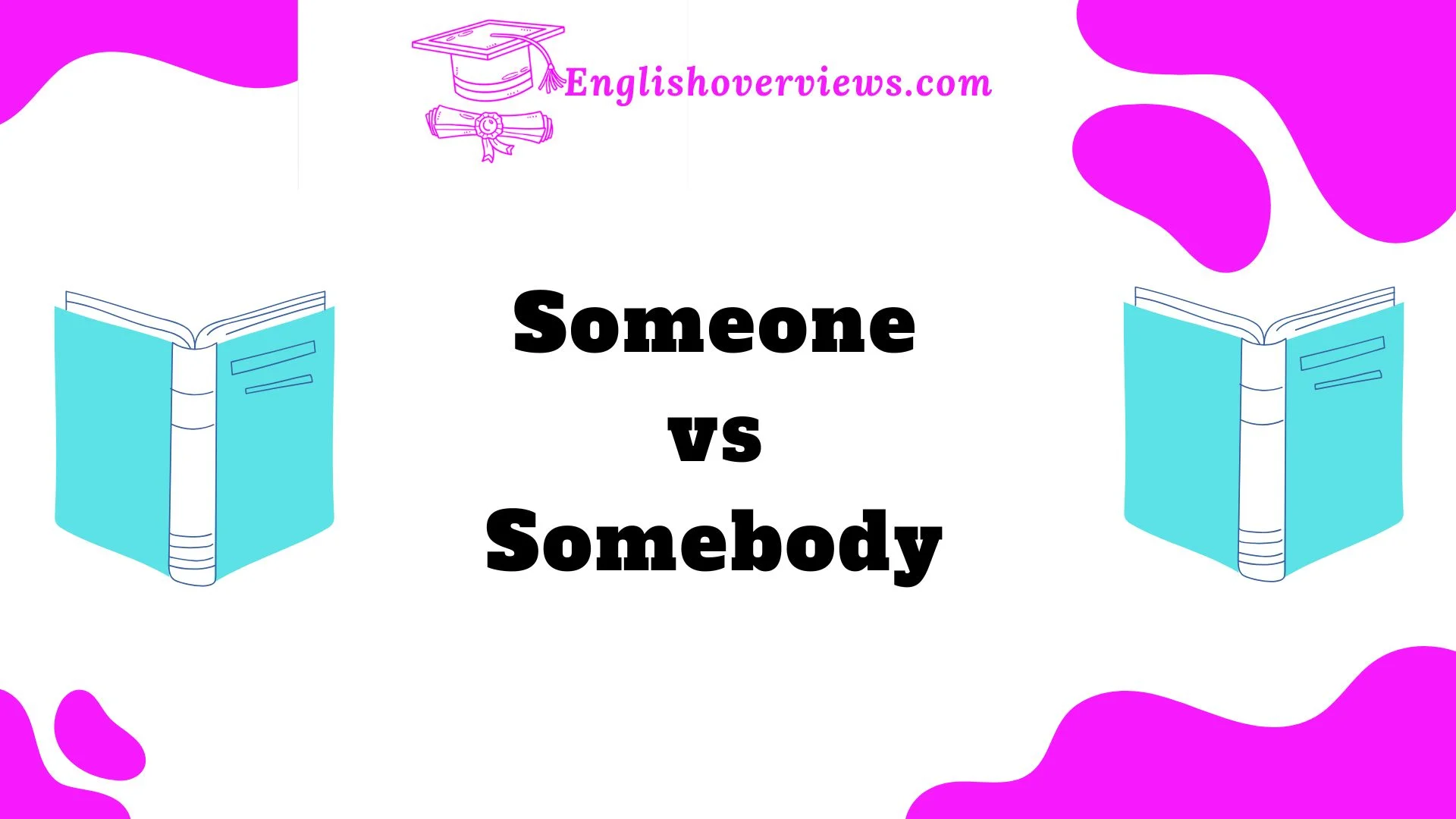Have you ever wondered about the difference between “someone” and “somebody”? These two words are often used interchangeably, but their subtle nuances can sometimes leave even native speakers scratching their heads.
Both refer to an unspecified person, but their usage varies depending on tone, formality, and context. Understanding the distinctions between these words can help you communicate more effectively and with greater precision.
Whether you’re writing a formal letter, having a casual conversation, or analyzing grammar rules, knowing when to use “someone” over “somebody” (or vice versa) can make a difference. This guide will break down the similarities, differences, and nuances of these terms to give you a comprehensive understanding. Let’s dive in and decode the mystery of these commonly confused pronouns.
Understanding the Basics: Definitions of Someone and Somebody
Definitions
- Someone: Refers to an unspecified person, often used in both formal and informal contexts.
- Somebody: Also refers to an unspecified person but leans slightly toward informal use.
Quick Comparison Table
| Aspect | Someone | Somebody |
| Tone | Neutral to formal | Neutral to informal |
| Frequency | More common in writing | More common in speech |
| Perception | Softer, less direct | More action-oriented |
Similarities Between Someone and Somebody
Both words:
- Are indefinite pronouns, meaning they refer to a person without specifying who.
- Can be used interchangeably in most cases without altering the meaning.
- Appear in similar grammatical structures, such as negative constructions or questions.
Examples:
- “Can someone help me with this project?”
- “I need somebody to fix this issue.”
Fun Fact: Both words date back to the Middle English period and share roots in Germanic languages, emphasizing their close connection.
Key Differences in Usage: Someone vs. Somebody
Tone and Formality
- Someone: Often chosen for more formal or professional settings.
Example: “Is there someone who can provide feedback on this report?” - Somebody: Preferred in casual or conversational tone.
Example: “Can somebody grab me a coffee?”
Psychological Perception
- Someone: Tends to feel more neutral and softer.
- Somebody: Conveys urgency or action, adding a slight sense of importance.
Usage in Common Expressions and Idioms
Some expressions traditionally favor one over the other:
- With “someone”:
- “Someone like you.”
- “If you need someone to talk to…”
- With “somebody”:
- “Somebody’s watching me.”
- “Be a somebody, not a nobody.”
Why? Historical usage patterns in literature and speech have solidified these combinations over time.
Formal vs. Informal Contexts
When to Use Someone:
- Professional Writing: Reports, emails, or essays.
- Examples:
- “We need someone to lead the meeting.”
- “Can someone confirm the schedule?”
When to Use Somebody:
- Casual Conversations: Informal chats or storytelling.
- Examples:
- “Can somebody turn off the lights?”
- “I saw somebody at the door.”
Grammar and Syntax Rules
Negative Constructions
- “There isn’t someone available right now.”
- “There isn’t somebody waiting outside.”
Questions
- “Is someone coming to the event?”
- “Did somebody call me?”
Relative Clauses
- “I need someone who can code.”
- “There’s somebody that I’d like you to meet.”
Examples of Contextual Usage
| Context | Someone Example | Somebody Example |
| Formal Letter | “Is there someone available?” | N/A |
| Casual Dialogue | N/A | “Can somebody help me here?” |
| Everyday Statement | “Can someone explain this to me?” | “I need somebody who understands.” |
Common Misconceptions and Mistakes
- Believing They’re Completely Interchangeable
While they often are, context can make one sound awkward.
Example: “Someone is watching me” (neutral) vs. “Somebody is watching me” (direct). - Overusing One Form
Using only “someone” or “somebody” might make your speech or writing sound repetitive.
Psychological and Emotional Nuances
Did you know?
- Someone often implies anonymity, focusing on the act rather than the person.
- Somebody can create a more vivid image, suggesting urgency or specific traits.
Final Thoughts on Choosing Between Someone and Somebody
Choosing between “someone” and “somebody” depends on tone, context, and preference. While they can often replace each other, considering the subtleties will elevate your communication. Keep this guide handy for crafting precise, audience-appropriate sentences.
FAQs
1. Can “someone” and “somebody” always be used interchangeably?
Not always. While they share similar meanings, tone and context can influence which one is more appropriate.
2. Is “somebody” less formal than “someone”?
Yes, “somebody” leans informal, while “someone” is more neutral and suited for formal contexts.
3. Do British and American English differ in their usage?
Both are used similarly in British and American English, though subtle regional preferences exist.
4. Which is better for professional writing?
Use “someone” in professional or formal writing for clarity and tone.
5. Are there idioms that exclusively use one term?
Yes, such as “Somebody’s watching me” or “Someone like you.”
6. Why do we have two words for the same concept?
Historical language evolution and regional preferences have given us these synonymous terms.
7. Does one sound more polite than the other?
Yes, “someone” often sounds softer and more polite.

English Overviews is a resourceful website dedicated to providing valuable content related to grammar and vocabulary. Muhammad Haroon has made notable contributions, sharing insights on various subjects, including WordPress themes and plugins. The primary goal of the site is to help users improve their English language skills effectively.











